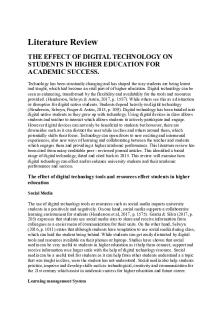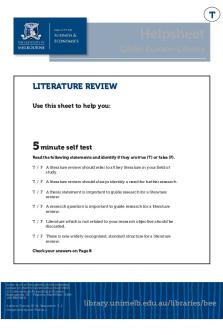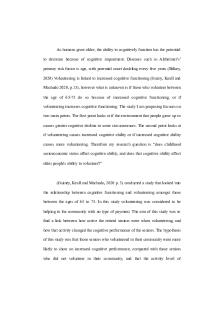The literature review for your dissertation proposal PDF

| Title | The literature review for your dissertation proposal |
|---|---|
| Course | Social Sciences Dissertation |
| Institution | Northumbria University |
| Pages | 1 |
| File Size | 43.5 KB |
| File Type | |
| Total Downloads | 86 |
| Total Views | 142 |
Summary
Dr Rachael Chapman...
Description
SO7002 The literature review for your dissertation proposal
The literature review is a process and will probably shape many of your chapters. It can change the nature of your dissertation as you read and make notes throughout. Its purpose is to identify the current position on your topic, to avoid repeating existing studies by finding out how they could be improved, to identify key theoretical debates, to highlight the gap in existing work, and to provide theoretical framing for your argument. In all types of dissertations (literature-based, placement-based, empirically-based), the literature review is vital and can influence your overall mark heavily. It is important to be critical when reading. Ask yourself, “So what?” whenever a statement is made by the author. Don’t just read an article, question their findings and validity. Was the sample size sufficient? Is the study outdated? Have there been recent discoveries that would change the outcome? Your literature review must not be too descriptive or broad. You cannot cover everything that you’ve ever read or seen. You have to be selective. Only summarise key relevant debates and other studies. You can mention there is a broad amount of literature on X, Y, and Z but you will focus on X because it has been understudied. Learn how to search effectively and efficiently. You can attend library sessions on searching for literature in various databases. A systematic literature review will set boundaries and search for key definitions and terms. Be selective with your sources. You need peer-reviewed academic work. Generally, speed reading involves looking at the abstract and conclusion. You can make a table to document your reading. Use columns like source, research question, theory used, methodology, key conclusions, and comments. This helps to organise your work and keep it in one place which you can refer back to throughout....
Similar Free PDFs

Dissertation Proposal
- 2 Pages

Dissertation Proposal
- 2 Pages

Literature Review
- 10 Pages

Literature Review
- 9 Pages

Literature Review
- 6 Pages

Literature Review
- 32 Pages

Proposal+template+Dissertation
- 4 Pages

Literature Review
- 9 Pages

Literature Review
- 5 Pages

Literature Review
- 15 Pages

Literature Review
- 4 Pages

Literature Review
- 16 Pages
Popular Institutions
- Tinajero National High School - Annex
- Politeknik Caltex Riau
- Yokohama City University
- SGT University
- University of Al-Qadisiyah
- Divine Word College of Vigan
- Techniek College Rotterdam
- Universidade de Santiago
- Universiti Teknologi MARA Cawangan Johor Kampus Pasir Gudang
- Poltekkes Kemenkes Yogyakarta
- Baguio City National High School
- Colegio san marcos
- preparatoria uno
- Centro de Bachillerato Tecnológico Industrial y de Servicios No. 107
- Dalian Maritime University
- Quang Trung Secondary School
- Colegio Tecnológico en Informática
- Corporación Regional de Educación Superior
- Grupo CEDVA
- Dar Al Uloom University
- Centro de Estudios Preuniversitarios de la Universidad Nacional de Ingeniería
- 上智大学
- Aakash International School, Nuna Majara
- San Felipe Neri Catholic School
- Kang Chiao International School - New Taipei City
- Misamis Occidental National High School
- Institución Educativa Escuela Normal Juan Ladrilleros
- Kolehiyo ng Pantukan
- Batanes State College
- Instituto Continental
- Sekolah Menengah Kejuruan Kesehatan Kaltara (Tarakan)
- Colegio de La Inmaculada Concepcion - Cebu



